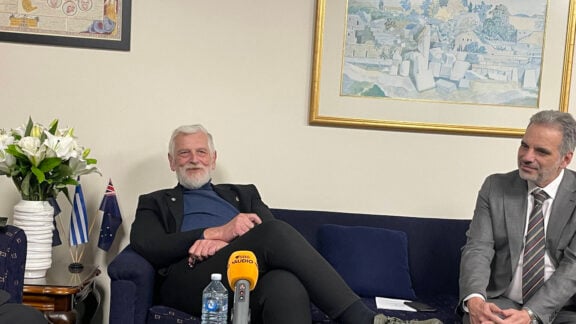The government on Thursday went on the defensive following the Council of State’s rejection of its flagship auction of television licenses, calling on the political opposition to participate in an attempt to convene the cross-party National Broadcasting Council (ESR), the media regulator, on Monday.
A week before the final deadline for the closure of TV stations operating without license, the State Council came to the rescue, all but destroying the Greek government’s plans to regulate the media sector.
The high court ruled against the process, deeming it unconstitutional, due to the bypassing of the official governing agency, the National Council of Broadcasting, in favor of the Secratariat of Information and Communication, which is overseen by Minister of State Nikos Pappas. The ruling is seen as a major blow to the government and its rhetoric of ending years of entitlement and corruption that allowed for private television channels to broadcast with temporary licenses, or with no license whatsoever.
The ministry auctioned four licenses for nation-wide broadcasting, which were sold to four businessmen, in a now infamous bidding process that saw all potential station owners (many among whom were already operating TV channels), enclosed in the General Secratariat building for three days, with no means of contacting each other, or communicating with those outside. The losing bidders were faced with the obligation of shutting down, within weeks after the bidding.
The Greek government was content with this process, which was seen not only as a way to finally end a long period of illegal broadcasting, but also a way to bring €246 million to the state coffers. The government pledged to allocate the funds for the relief of those in need and to revive social services. In her official statement, government spokesperson Olga Gerovasili appeared to be very emotional and irritated by the turn of events, attacking the the court for finding Greece’s first two bailout programs and a private sector debt restructuring in 2012 constitutional while deeming the government’s auction unconstitutional.
The fees the winning channels paid that the government would be obliged to return will deprive children of places at kindergartens and school meals, she said, referring to the social welfare initiatives on which the government had planned to spend the proceeds of the auction. More importantly, the ruling is seen as a lifeline for the status quo, which the same court had also ruled as unconstitutional.
After initially planning to introduce a new bill that would provide temporary licenses to all TV stations for a limited period of time, the Greek government is now moving forward with another way to tackle the State Council’s ruling: assembling the Parliament, in order to convene the National Broadcasting Service. Dismantled after the end of its members’ terms, the independent authority remained inactive, as the opposition party has been steadily refusing to participate in the parliamentary process of appointing members for the council. According to analysts, this stalling process was orchestrated along with the TV station owners, to undermine the government’s plan to introduce a law for the operation of private television, after 27 years of anarchy.
“It will now be clear if ND really does have objection as regards institutional issues or if it just doesn’t want the auction to happen and the current regime to be extended,” a source close to Alexis Tsipras said, referring to New Democracy.








